Experience is the process through which conscious organisms perceive the world around them.
Contents
Experience may also refer to:
Experience is the process through which conscious organisms perceive the world around them.
Experience may also refer to:
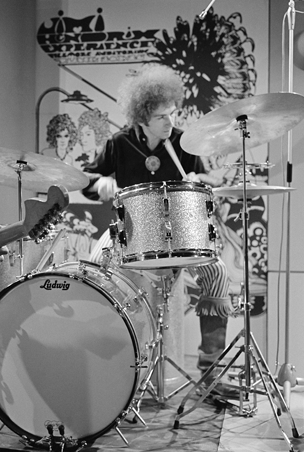
John Graham "Mitch" Mitchell was an English drummer and child actor, who was best known for his work in the Jimi Hendrix Experience for which he was inducted into the Rock and Roll Hall of Fame in 1992. He was inducted into the Modern Drummer Hall of Fame in 2009.
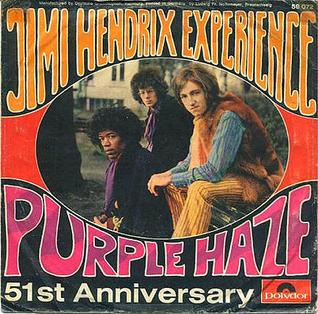
"Purple Haze" is a song written by Jimi Hendrix and released as the second single by the Jimi Hendrix Experience on March 17, 1967. The song features his inventive guitar playing, which uses the signature Hendrix chord and a mix of blues and Eastern modalities, shaped by novel sound processing techniques. Because of ambiguities in the lyrics, listeners often interpret the song as referring to a psychedelic experience, although Hendrix described it as a love song.

Edwin H. Kramer is a South African-born recording producer and engineer. He has collaborated with several artists now in the Rock and Roll Hall of Fame, including Jimi Hendrix, the Beatles, David Bowie, the Rolling Stones, Led Zeppelin, Eric Clapton, the Kinks, Kiss, John Mellencamp, and Carlos Santana, as well as records for other well-known artists in various genres.

Axis: Bold as Love is the second studio album by the Jimi Hendrix Experience. It was first released by Track Records in the United Kingdom on December 1, 1967, only seven months after the release of the group's highly successful debut, Are You Experienced. In the United States, Reprise Records delayed the release until the following month. The album reached the top ten in the album charts in both countries.
"Little Wing" is a song written by Jimi Hendrix and recorded by the Jimi Hendrix Experience in 1967. It is a slower tempo, rhythm and blues-inspired ballad featuring Hendrix's vocal and guitar with recording studio effects accompanied by bass, drums, and glockenspiel. Lyrically, it is one of several of his songs that reference an idealized feminine or guardian angel-like figure. At about two and a half minutes in length, it is one of his most concise and melodically focused pieces.

Band of Gypsys is a live album by Jimi Hendrix and the first without his original group, the Jimi Hendrix Experience. It was recorded on January 1, 1970, at the Fillmore East in New York City with Billy Cox on bass and Buddy Miles on drums, frequently referred to as the Band of Gypsys. The album mixes funk and rhythm and blues elements with hard rock and jamming, an approach which later became the basis of funk rock. It contains previously unreleased songs and was the last full-length Hendrix album released before his death.
"Red House" is a song written by Jimi Hendrix and one of the first songs recorded in 1966 by the Jimi Hendrix Experience. It has the musical form of a conventional twelve-bar blues and features Hendrix's guitar playing. He developed the song prior to forming the Experience and was inspired by earlier blues songs.

"Voodoo Child (Slight Return)" is a song recorded by the Jimi Hendrix Experience in 1968 that appears as the final track on the Electric Ladyland album released that year. It contains improvised guitar and a vocal from Jimi Hendrix, backed by Noel Redding on bass and Mitch Mitchell on drums. The song is one of Hendrix's best known; it was a feature of his concert performances throughout his career, and several live renditions were recorded and released on later albums.

Rainbow Bridge is a 1971 film directed by Chuck Wein centering on the late 1960s counterculture on the Hawaiian island of Maui. Filmed in summer 1970 with non-professional actors and without a script, it features largely improvised scenes with a variety of characters. To bolster the film, executive producer Michael Jeffery brought in his client Jimi Hendrix to film an outdoor concert. Hendrix's heavily edited performance appears near the end of the film.

"Fire" is a song written by Jimi Hendrix and recorded by the Jimi Hendrix Experience in early 1967. It has been described as "an exercise in soul, psychedelic rock, and polyrhythmic jazz-inspired drumming" by AllMusic critic Matthew Greenwald. The song was remixed in stereo for the American release of the album. In 1969, it was released as a stereo single in the UK with the title "Let Me Light Your Fire".
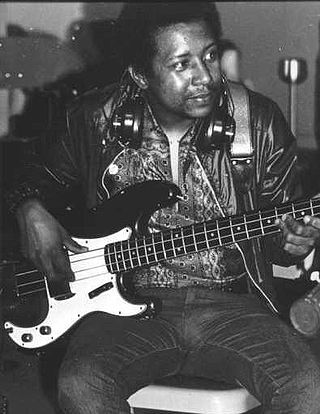
William Cox is an American bassist, best known for performing with Jimi Hendrix. Cox is the only surviving musician to have regularly played with Hendrix: first with the experimental group that backed Hendrix at Woodstock, followed by the trio with drummer Buddy Miles that recorded the live Band of Gypsys album, and, lastly, The Cry of Love Tour trio with Mitch Mitchell back on drums. Cox continues to perform dates with the Band of Gypsys Experience and the Experience Hendrix Tour.

Randy Hansen is an American guitarist best known for his "Rock Tribute Act" honoring Jimi Hendrix. He composed 17 minutes of the soundtrack for the 1979 movie Apocalypse Now,. His debut album was released in 1980 on Capitol Records and was recorded at the Automatt Studios in San Francisco with Scott Rosburg on bass and vocals and Charles Tapp on drums and vocals. That group played two North American tours which included several coliseum shows with Bob Seger, Sammy Hagar, REO Speedwagon, Head East, Triumph, Poco and Blue Öyster Cult.

The Cry of Love Tour was a 1970 concert tour by American rock guitarist and singer Jimi Hendrix. It began on April 25, 1970, at the Forum in Inglewood, California, and ended on September 6, 1970, at the Love & Peace Festival in Fehmarn, West Germany. The majority of the 37 shows were in the United States, with two each in Sweden, Denmark, and West Germany, and one in England, where Hendrix was the final act at the Isle of Wight Festival 1970.

Jimi Hendrix (1942–1970) was an American guitarist whose career spanned the years between 1962 and 1970. His posthumous discography includes recordings released after September 18, 1970. Hendrix left behind many recordings in varying stages of completion. This material, along with reissues of his career catalogue, has been released over the years in several formats by various producers and record companies. Since Experience Hendrix, a company owned and operated by members of the Hendrix family, took control of his recording legacy in 1995, over 15 Hendrix albums have appeared on the main US albums chart. Several of these have also placed on charts in more than 18 countries around the world.

"Hear My Train A Comin'" is a blues-based song written by Jimi Hendrix. Lyrically, it was inspired by earlier American spirituals and blues songs which use a train metaphor to represent salvation. Hendrix recorded the song in live, studio, and impromptu settings several times between 1967 and 1970, but never completed it to his satisfaction.
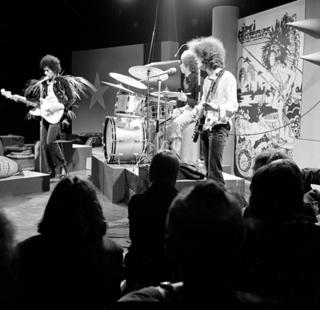
Jimi Hendrix (1942–1970) was an American guitarist and singer-songwriter whose career spanned from 1962 to 1970. He appeared in several commercially released films of concerts and documentaries about his career, including two popular 1960s music festival films – Monterey Pop (1968) and Woodstock (1970). A short documentary, Experience (1968), also known as See My Music Talking, was also screened.
TaharQa Z. Aleem and Tunde Ra Aleem were formerly known as Albert and Arthur Allen. Although they wore many hats, they are most notable for being American musicians, producers, authors, and entrepreneurs originally based out of Harlem, NY, in addition to being close friends and musical collaborators with Jimi Hendrix.
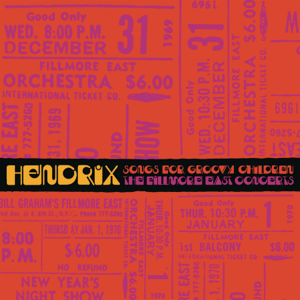
Songs For Groovy Children: The Fillmore East Concerts is a chronologically sequenced collection of American musician Jimi Hendrix's 1969–1970 New Years recorded performances at the Fillmore East in New York City. It was released as a box set of five-CDs on November 22, 2019 and an eight-LP set on December 13.
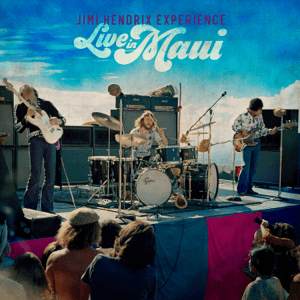
Live in Maui is an album by the Jimi Hendrix Experience documenting their performance outdoors on Maui, Hawaii, on July 30, 1970. It marks the first official release of Hendrix's two full sets recorded during the filming of Rainbow Bridge (1971). The two-CD and three-LP set was released on November 20, 2020, along with a video documentary titled Music, Money, Madness ... Jimi Hendrix in Maui.

Los Angeles Forum: April 26, 1969 is a live album by the Jimi Hendrix Experience. It was recorded during the group's last North American tour and includes a mix of popular Experience album songs along with some instrumentals. The album is the first full live release by the trio with Hendrix, Noel Redding, and Mitch Mitchell since 2013's Miami Pop Festival.